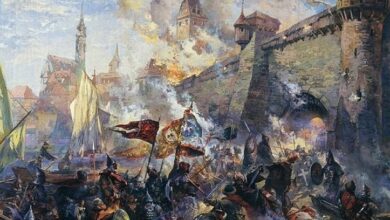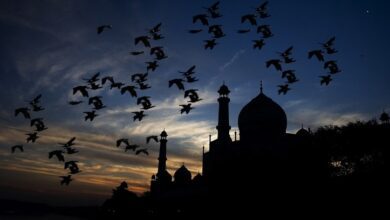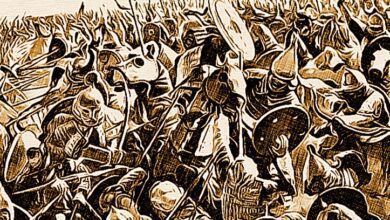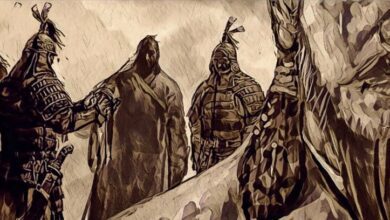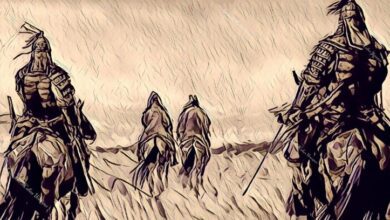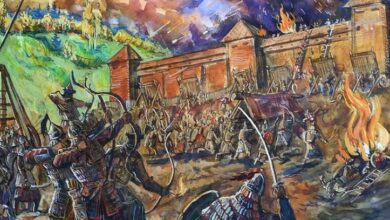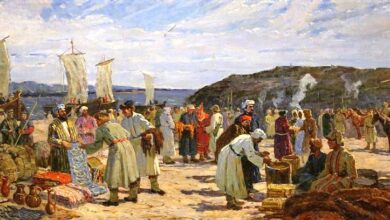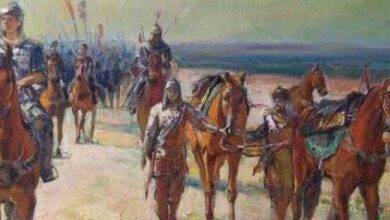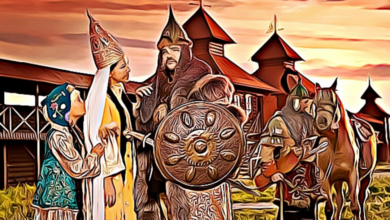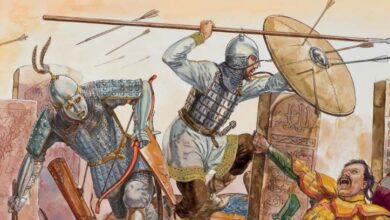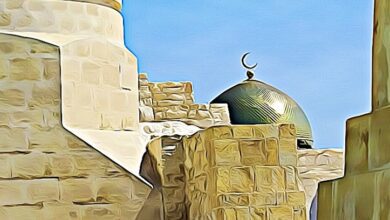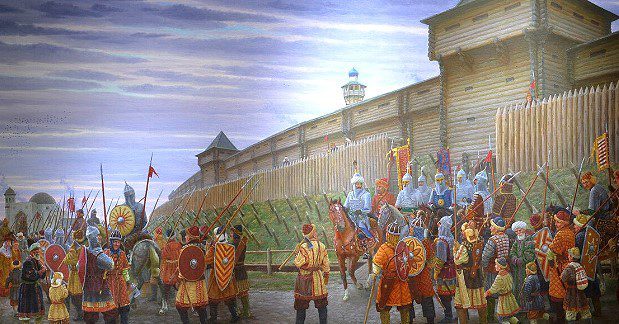
Ghazi Baraj Tarihi. Chapter 14
O reasons for the rise of Talib, in addition to this anecdote, told by Mohammed-Ghali, I found only the following in Yakub. When one day Bakhta was unable to collect taxes from Baityuba at all, Nasyr ordered the Kazakh Aksak-Ahmed to take his place in Bulyar.
94
The offended Bakhta returned to his fortress Shepshe, and Ahmed recruited a gang of Tamtazai horse thieves and began to raid subashes. He kept most of the booty for himself, and sent the smaller part to Bolgar, but Nasyr was happy with these crumbs. The enraged Igenchei tried more than once to finish off the lancers, but their attempts to take the citadel of Bulyar by storm ended in constant failure. However, boasting ruined Ahmed. Once he decided to invite the Kan himself to Bulyar. But when the royal caravan approached the city, it was suddenly attacked by a detachment of Turkmens. Mohammed barely escaped thanks to the courage of Talib, who was with him, and in anger put his son Ghazan in the place of Ahmed. Emir Talib immediately took steps to improve the situation in the region. So, he persuaded Bul's son Kukchu to lend him funds in exchange for his support of the Amirovs' rights to Kashan, which Nasyr threatened with new exactions. With this money, he formed a 6,000-strong army, the soldiers of which served constantly. It was mainly Subash and Chirmysh, whose economy was devastated by the war, who went there. Talib established high salaries for the soldiers, and they hoped to save up money to restore the ruined economy or help their relatives. In addition, 3/4 of the booty was left to the soldiers, and this made them eager to go to war. However, in the spring of each year, any bakhadir could leave the service, but almost no one did this, since in this case complete poverty awaited him. The selection for the army was strict, for one place was claimed by 100 and 200 people dying of hunger. The training was no less severe, and the death of warriors during training fights was not put into anything. Each fighter of the army received the average knightly weapons, that is, the weapons of the Jura, and therefore was equated with the average knight. Hundreds in this army were led by kortbashs, thousands were led by kartamans, and the commander of this army was a sardar. And the whole army received the name "Kursybai", since its first soldiers were the Igenchei of the village of Kursybai, burned to the ground by the Turkmens. The unbashi of the kursybai was equated with the yuzbashi of the ordinary army, the centurion - with the menbashi, the kartaman - with the sardar, and the sardar - with the emir. Later, being already a Kan, Talib gave the sardars of the kursybay the right to enter the king without prior notification... The third line of the kursybay, which was occupied by the juldashi of the Turkic mercenaries in the ordinary army, was made up of young warriors or "puppies". There were 3 thousand of them. The second (middle) line consisted of 2 thousand experienced warriors, who were called "Bashkorts", and the first - a thousand of the best warriors, who were called "Barynjars" ("Baryn-Yars"). The salary of the Bashkorts exceeded, the salary of the “Kyucheks” twice, and the Baryndjars - four times, and for the sake of moving to a higher rank, the kursybays spared no effort in battles ... Kukcha Amir became the first sardar of the kursybay ...
The kursybays, always ready for battle, were able to intercept and destroy several light Turkmen detachments, and in 959, under the new Bulyar fortress of Kylgan, they finished off the army of Shonkar and his brother Lachyn. The captured khans were cut off both hands and released to Arslan. He, seeing the brothers in such a miserable state, forgot about everything in the world and rushed with the rest of the horde to Bulyar. But one badjanak, specially sent to Arslan under the guise of a defector, led the Turkmens to the unfinished Baityubin fortress - right under the blow of the kursybai. 60,000 bonds rashly rushed to rob the tents that Kukcha had purposely set up in the fortress and near it, and woke up only after the first volleys of the “puppies”. Those who climbed into the fortress were locked up and burned there, while the rest rushed into the steppe in horror. However, two or three thousand managed to escape. Arslan himself was caught with a lasso and dragged to Kukcha. With a bloodied mouth, the khan began to beg for mercy, promising a rich ransom for his freedom. Kukcha calmly listened to Arslan and answered him: “You and your younger brothers burned 80 villages to the ground, not counting the hundreds of partially injured, and I am glad that for each of them I paid a thousand lives of your robbers. And for Kurjun-Samar and Balus killed in it, I pay with your head. With these words, the sardar dismounted from his horse and cut off the Khan's head. The fortress, restored later, began to be called Arslanbash in memory of this ...
95
Learning about this terrible defeat, Uzbek wanted to flee to the Samanids, but Kubar held him by force and ordered Bakht-Yunus and Mikail to make a new raid on Bulyar. The brothers again categorically refused to fight against fellow believers and relatives, and then the enraged Bek deprived them of half of their property and sent them to Khorezm.
Already the son of Bakht-Yunus, Seljuk, avenged this humiliation by destroying the possession of Gali ...
Thus ended this long Turkmen war. Delighted by an unexpected victory, Mohammed found the strength to return to public affairs for a moment and in 960 appointed Talib as his vizier. All power was in the hands of the emir, who from that time began to call himself and Mumin. The Talib immediately returned to the Almysh legislation, shortened the noses of the stealing officials, and the country instantly came to life...
But Talib decided not to stop there and to carry out Jafar's plans to destroy the Khazar rule and annex the original Bulgar territory to the Bulgar. Suddenly, a strong obstacle arose on this path in the face of an immensely vain Urussian ulubiy - the son of Ugyr Lachyn and Barys. This ruler gathered under his banner 20 thousand Sadums and 50 thousand Balyns, carried away by his intention to take and completely plunder Bulgar and Khazaria, and in 964 took Djir with them. The governor of Djir, the son of Huma Syp-Gusman, fled to Bolgar. Following him, the Kan Ulugbek Sain, also expelled by Barys, arrived in the capital. He said that Haddad offered Barys to help take Kan, and Ulubiy immediately took Kan for the Batyshs. Both Ulugbeks were awaiting execution, but, unexpectedly for them, Talib received the guilty very mercifully and ordered them to go to Barys with a proposal to jointly conquer Khazaria in exchange for Djir, Kan and the western part of Kortdzhak. Barys, hearing this from them, did not believe his ears and personally arrived in Bolgar for confirmation of this proposal. The Uruses appeared in front of the Bolgar at the moment when Mohammed was feasting in Khalja. Seeing the Sadumians, the Kan ran in a panic along with his entire retinue. They took a breath only in Nur-Suvar, and the camping cauldrons they left on the fire went to the Uruses, and they ate with pleasure on the way. In the midst of the feast, Talib appeared and agreed with Barys on negotiations on the Idel Island "Bee" opposite Bolgar. It was possible to drive up to this island from one side, through shallow water, on a horse, and from the other - to sail on a ship ...
The Emir said that in exchange for Barys's participation in the war against Khazaria, the Bulgars would cede Djir, Kan and Western Kortjak to Rus for an annual tribute in the amount of the Djir tribute. And this is a huge territory enclosed between Kara-Idelyo and Sain-Idel (Aka), except for its eastern part - the Lokyr region between the Lokyr river, which flows into Gul-Asma, Aka and Kara-Idelyo, which remained behind the Bulgar. Talib proposed to talk about the division of Khazaria after its defeat. Barys gladly agreed, and promised to start a war by attacking Khin ... By transferring Kan to Barys, Talib, among other things, wanted to quarrel the overly strong son of Ugyr with the Batyshs. And the emir succeeded.
On the way back, Barys kicked Haddad's son Alyp out of Kan. In response, he sent him a letter in which he said: “The Batysh people are considered a people formed as a result of a mixture of Ulchians and Murdases. In fact, the Batyshs are the descendants of the Murdas and the Khuds of the Sadum tribe, who once owned Russia. Therefore, he, Alyp, has more rights to be a lube of Rus' than Barys, and will try to fulfill them on occasion "...
But unexpectedly, in Bulgar itself, an obstacle to the war with Khazaria was found in the face of Mardan. Bellak aksakals feared that. the annexation of Khazaria to the Bulgar would overly strengthen the Kans and pose a threat to the liberties of Mardan. Therefore, Emir Bulat maintained a secret alliance with Haddad and Alyp-biy, in which case they could jointly repel their enemies.
Mohammed, frightened by Barys, approved the transfer of two ils to him in exchange for an alliance with him. It only remained to overcome the resistance of the Mardans - and Talib obtained their consent to a war with the Khazars in exchange for a promise to transfer the entire territory of Khazaria to Bellak, except for Khin. But Dalib was not going to share what he had taken from the Khazars with Barys. “Khazaria is not the swampy hummocks of Kortdzhak, Dzhira and Kan. The capture of Khazaria will make Bulgar the most powerful power, for it will put under our power all the ways from the countries of the infidels to the countries of the East. And sharing this power with anyone would be real madness,” said Talib Kukche before the war with Khazaria.
97
In order to prevent Barys from snatching the Khazar booty from the Bulgar, Talib sent his son Mamli Masgut to the Turkmens, and he easily persuaded Khan Mikail with his 12 thousand zhigits ready for anything to go to the Bulgar service... In the winter of 965, Mikail attacked Itil on the move and forced Kubara to transfer almost all his forces to the capital. After that, Kukcha and Daud came to Khin and informed its inhabitants that they were threatened by an attack by the Balyns and that Kan Bulgara would gladly shelter them. The Khnins, who had already heard about the massacre of the Batyshians in Kan by the Uruses, without much thought moved with all their belongings to the Bulgar and were settled there, mainly in Bandzha, Bulyar and Yana Samara on Kinel. Upon learning of this, Kubar personally rushed to Hin in order to prevent the resettlement, but the brother of Kukchi, batyr Sal-Sal, blocked his path and beat him away in a fierce battle. At the same time, he received several serious wounds and died shortly after returning to Kashan. Only after the last inhabitant left Khin, Kukcha left Khazaria with his kursybay, and Kubar was again able to take possession of the untouched city. Realizing that Khin was the main obstacle on the way to Itil, the bek fortified it with a strong garrison and decided to defend it to the last. In the summer of 965, Barys attacked Khin, sailing to it from Bashtu along Buri-chai, the Saklan Sea and the Shire. It is unlikely that he himself would have been able to take this strong city if the Rumians had not helped him with warriors and wall-beating equipment. When the walls of Khin were breached in two or three places, the Sadumians and Galidjians burst into the city and carried out their usual massacre there. Delighted by the victory, Barys ordered his ambassadors to tell Talib that he would conquer Khazaria himself, and Talib promised not to interfere with him. Kubar, having learned about it, immediately rushed to Hin from Itil. While he was trying to drive the Uruses out, Kukcha with Daud and Mikail put the Turkmens of the Khazar Bek to flight and laid siege to Itil. The appeal of the Bulgar Kan to the Itilians about resettlement in the Bulgar in order to save themselves from the inevitable Balyn invasion was favorably met by the majority of the Itilians here as well. Without delay, the best owners of the Khazar capital went to Bulgar under the protection of the kursybay. The Uzbeks who remained in Itil and the Khazars and Turkmens associated with it did not dare to interfere with the resettlement and, horrified by Kukcha, locked themselves in the city's citadel. The Itils also settled in Bandzha and Bulyar, and one of the baliks of Bulyar even received the name Itil...
Kubar failed to recapture Hin. Kasheks and Saklans joined Barys, and with their help the Uruses threw back Kubar and broke through to Bekhtash, along which ships are transported from Shir to Idel.
But suddenly the Burdjans attacked Khin and took it, forcing Barys to return and take the city again. After the second capture of Khin, he wintered in this city, where he was supplied with Rums from Dima-Tarkhan. In the summer of 966, Barys again went from Khin to Itil and this time broke through to the Khazar capital. At his approach, the few inhabitants who remained there fled with Uzbek and Kubar on ships to Khorasan through Menkyshlak and eventually settled in Bukhara. From them came the so-called Bukhara yahuds, who soon began to flourish in a new place and established the closest trade relations with the Bulgar Muslim Khazars. Barys found in Itil only Kubar's garrison, which frivolously surrendered. Ulubiy, not finding any prey in the city, fell into an indescribable rage and slaughtered all the prisoners. Then Barys decided to take revenge on the Burdjans for the attack and went on ships to Samandar with 20 thousand people, and sent 30 thousand to the Khazar Burtases and Batyshians. Samandar was completely destroyed by the Balyns, after which they set off on foot and, with the help of the Saklans and Kasheks, defeated six more Burdzhan cities. After that, the Saklans, Kasheks and Djurashians began to dominate in Djurash and Kara-Saklan. Barys concluded an alliance with them and handed over to them the cities taken from the Burdzhan Bulgars (Kumyks, Karachays and Burdzhans). At the same time, the Burdjan merchants and craftsmen who survived the massacre fled to the Bulgar, and the rest took up cattle breeding... Without the Bulgar population engaged in trade and craft, these cities fell into complete decline.
The Saklans, Kasheks and Djurashians were very pleased with the acquisitions, but when the 50,000-strong army of the Uruses moved from Bekh-tash to Mukhtasar, they announced an expected attack on Khazaria by the Turkmens and remained in place. Mukhtasar was the center of the Khazar Burtasia, and all the Khazar Burtases gathered here to fight the Uruses. There were only 10 thousand of them, and they bravely met the enemy in the hope of the help of the Batysh people promised to them ... However, the help was too late, and the numerical superiority of the Balyns decided the matter in their favor ... Without leaving a single survivor in Mukhtasar, the voivode Barys Saban1Kul moved on the Batysh, who managed to take away among the Balyns of Kan. But Alsh, with his batyshs and the Burtases who fled to him, ambushed the Uruses at Khorysdan and cut almost the entire army of Barys. Saban-Kul returned to Bashtu in a miserable condition and with only two thousand warriors. At the same time, the kursybay, exhausted with nothing to do, took Dzhir, and Kukcha led all the owners out of here to Bulgar. When Barys began to reproach the ambassadors of Talib for this, they said that the emir was forced to do so in connection with the non-payment of the “djir tribute” by the Ulubi. It was only then that Barys remembered that in the heat of the moment, in the hope of a rich jackpot in Khazaria, he promised to pay this tribute and was horrified: there was nothing to pay.
98
99
In Khazaria, the Uruses got almost nothing, and the Burdzhan booty went in payment for Rum help. But this did not pay off even a hundredth of the Rumian debt of Barys. The Rumians, having heard about the difficulties of Ulubiy and not hoping for a return of their money, decided to receive at least military assistance from the Uruses and offered Barys additional money in exchange for his joint attack with Rum on Ulak-Bulgar and, having received the necessary money from Rum, he immediately paid them off with Talib and got Kan again. Ulubiy hoped to quickly put an end to the Ulak-Bulgar, but got bogged down in this war. In 969, when it became clear that Barys had lost the whole case in Ulak-Bulgar, Talib brought Bulgar troops into Khazaria - kursybai and the Turkmens of Mikail. The occupation of Khazaria passed without obstacles, except for an unexpected skirmish in Itil. The indefatigable Kubar, who managed to sail from Menkyshlak with a detachment of Khorezmians, turned out to be the culprit and occupied Itil. At the very beginning of the skirmish, Kubar's people shot Mikail, who was calmly entering the city. Annoyed by this, the Turkmens slaughtered all the Khorezmians, and Kubar was cut into pieces.,.
At our approach, the Saklans retreated from Idel and Shir without a fight, and for this Talib graciously left behind them the southern lands of Khazaria, adjacent to the mountains. The border between Bulgar and Saklan passed along the rivers Sal and Kum. In the west, the Bulgarian border passed along the Shir and Kubar, and from Kubar - to Boryn-Inesh ... The Khina district, as previously determined, remained under the control of the Vali appointed from the capital, and the rest of Khazaria from Saratau to the mouths of the Idel, Dzhaik and Umbet was included in the Mardan under the name Saksin. The center of Saksin was the city of Sakchy or Saksin-Bolgar, built on the orders of Talib, where Burdzhan merchants and craftsmen settled, as well as some Itil fugitives who agreed to convert to Islam. Other returning Itilians were settled in Itil itself, but it was renamed the city of Kaituba...
With the annexation of Khazaria, the Bulgar state turned into a real power, and our rulers began to call themselves the sovereigns of Great Bulgaria ... Since then, our people began to call Kara-Saklan the steppes between Sula and Buri-chai, and Ak-Saklan - the steppes between Buri-chai and the Bulgarian border …
At that time, the Badjanaks of Kara-Saklan, who were in close alliance with the Ulak-Bulgar, began to be oppressed by Barys and were forced to unite under the leadership of Khan Kura to repel the encroachments of the Balyns. In 969 Kura Khan raided Bashta and plundered its settlements, and in 972 ambushed Barys returning from Ulak-Bulgar and put an end to him. However, after that, the Badjanak biys, who hated unity of command, again dispersed into their hordes and deprived Kura-Khan of royal power. Unable to endure such humiliation, Kura Khan left Kara-Saklan with 9 thousand of his Badjanaks and entered the service of Bulgar. Talib gave him the nomad camps of the Khinsky district, and most of the Saksin steppes had previously been given over to the Turkmen biys of the deceased Mikail, who also did not like unity of command and did not even think about electing a new one after the death of the khan ... Kura-khan told tebir Masgut, and he, in turn, - to his father Mamli that Barys, captured by the Badjanaks, began to beg for mercy. To this, Kura Khan told him: “Your head, even with a Khin scythe, will not add wealth to me, and I would willingly give you life if you really valued it. But you yourself valued it below [several measures of] honey - the fare for safe passage through my dominions, so let your1 head serve as a cup for this drink as an example to all overly proud and frivolous. From the skull of the ill-fated Barys, the khan really ordered a cup to be made and he drank a ball from it. His daughter became the wife of Timar, the son of Mohammed from the Bajanak Biki, nicknamed Badjanak. It was this emir who very soon began to threaten the sovereignty of Talib more than any enemy of the State. However, Talib was not a simpleton in secret palace intrigues. Thus, he publicly branded the policy of his ally Timar Bulat, who during the period of the Turkmen war did not allow the Mardans to fight against Khazaria and enriched himself with the attacks of the Badjanaks on the Turkmens returning from Baityuba with booty. The ashamed aksakals and the owners on their jien elected Ibrahim, the son of Mohammed, loyal to Talib, as the new ulugbek of Mardan. In 970, Kan Mohammed, at the request of Timar, appointed Bolgar Ulugbek to him, and he immediately began to call himself Mumin, but a few weeks later, Aisylu, at the request of Talib, hinted to the Kan at the harassment of his son, and Mohammed immediately handed the fate of his son into the hands of the vizier. The Talib sent the newly-minted Mumin as governor to Bulyar, under the supervision of the stern and silent Kukchi. Talib appointed the third son of Kan Mohammed, Masgut, as the governor of Nur-Suvar, who bowed before the vizier for his generosity and tolerance for his dissolute lifestyle. Timar, who in the same year organized a conspiracy against Talib and sent an invitation to Masgut to take part in it, was cruelly mistaken in his brother. Masgut immediately delivered Timar's note to the vizier, and he forced the participants in the conspiracy - the sons of Dzhakyn Balak and Vakhta, as well as the Badjanak biy Hasan - to leave the Bulgar. They went to the Modjar kingdom and corresponded for a long time • from there with Timar, until, finally, the Badjanak war stopped the regular contacts of Bulgar with Avaria…
100
101
Only a year before his death, in 975, Kan Mohammed began to suffer from the fear of persecution and transferred his disgraced eldest son Timar from Bulyar back to Bolgar. Talib did not tolerate this and went to Bulyar, where he calmly began to wait for the denouement of the family drama. In 976, Mohammed died, but as soon as Timar tried to proclaim himself a Kan, he was captured by the vizier's people and, q in order to save his own life, had to raise Talib Mumin to the royal throne together with Kukcha, Abdallah and Masgut. After that, Kan Talib removed Timar to Nur-Suvar, and Bulyar gave Masgut. And it must be said that Talib gave the Baytyube Ulugbeks the right to appoint Tamty Ulugbeks, which made the Bulyar governor a very influential figure. The Talib, shortly after the transfer of the Djir to Barys and the accession of the Khazars, forbade foreign merchants to pass through the territory of the Bulgar and trade with each other within the limits of the State. By this he forced the foreigners to sell all their goods to the Bulgar merchants and to buy the imported goods they needed from our own - but at higher prices. After a series of accidents with foreigners in the North, Talib generally closed the northern provinces to foreigners. Only the Sadumians, who came to Biysa along the Chulman Sea and had our permits in their hands, could pass through these regions. This brought such benefits to our merchants that they said: "Our trade was founded by Talib." Talib himself bequeathed to his successors: “The main thing that you must do is not to change the established traditions of ils, not to exhaust the people with new taxes and to maintain the power of the Bulgar over all the roads from the countries of the infidels to the states of Islam” ... At the same time, Talib tried not to fight without special need , and, for example, in order for the Urussian beks not to delay the payment of the Djir tribute, he began to take their children hostage ...
Thus, he turned the Bulgar into a truly great and prosperous power, known in all parts of the enlightened world...
102

